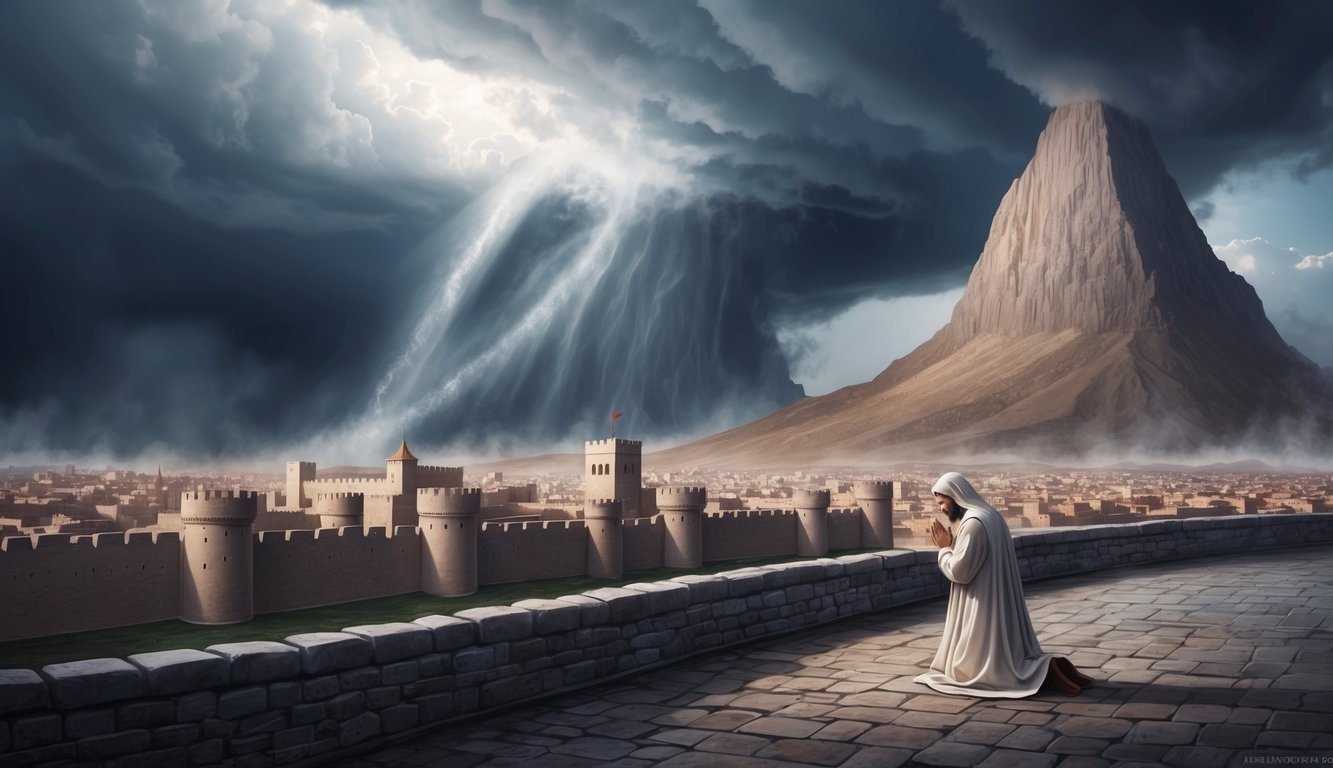Don’t Miss Out On This Unique Astrological Opportunity
Are you tired of spinning your wheels and getting nowhere? Simply put, you’re out of sync: you’re out of alignment with your astral configuration.
But: there’s a kind of map that can help you reclaim your alignment. Think of it as your own personal blueprint to success and happiness: a blueprint that will help you live your most amazing life.
Get started here.
Psalm 2 is a captivating text from the Holy Bible that has sparked considerable discussion among scholars and believers alike.
This psalm addresses themes of power, rebellion, and divine authority, capturing an intense dialogue between earthly kings and the divine. Understanding Psalm 2 provides insight into the biblical perspective on leadership and divine right.
Many see this psalm as a prophecy related to the Messiah’s reign, linking it intricately with Christianity.
It echoes the promises given in texts like 2 Samuel 7 and is frequently connected to New Testament writings, highlighting its continued relevance in religious studies.
Exploring this psalm offers a window into the ancient world’s expectations of a righteous leader under God’s ordinance.
The structure and language of Psalm 2 also intrigue readers, as it mixes poetic devices with dramatic imagery.
This combination makes it a compelling study for those interested in theology, literature, and historical context.
By taking a closer look at its verses, you can uncover layers of meaning that illuminate its enduring influence across different cultures and epochs.
Key Takeaways
- Psalm 2 discusses divine authority and leadership.
- It connects Old Testament prophecies with the New Testament.
- Its poetry and themes remain relevant today.
Historical and Literary Context
Psalm 2 holds a significant place in both history and literature.
It addresses themes of kingship, prophecy, and divine anointing.
Understanding its background helps you comprehend its influence on religious thought.
Authorship and Purpose
Believed to be written by King David, Psalm 2 serves multiple purposes.
It’s a royal psalm, often associated with the inauguration of a king in ancient Israel.
The psalm highlights the role of a king as the anointed one, or Messiah, chosen by God.
The poem speaks against nations that oppose God’s anointed ruler.
This reflects a long-standing belief that God supports and protects those He anoints.
The psalm has been interpreted as a prophecy, foretelling the coming of a future king, the Messiah, who will establish God’s rule on Earth.
Position Within the Psalter
Psalm 2 is the second psalm and pairs with Psalm 1 as an introduction to the entire collection.
While Psalm 1 discusses the blessed life of a righteous individual, Psalm 2 focuses on the divine authority given to a king.
This positioning suggests the importance of both personal piety and communal governance under God.
Scholars often explore the ideological connections between the two psalms.
Considered as a whole, they lay a foundation for understanding the rest of the psalms.
This helps you see the integration of individual and collective faith in Israelite society.
Thematic Analysis
Psalm 2 explores themes of rebellion, divine authority, and sovereignty through vivid imagery and bold declarations.
It underscores the futility of opposing divine plans and emphasizes the certainty of the Lord’s rule over all nations.
Rebellion of the Nations
In Psalm 2, the nations rage, and the peoples plot in vain against the Lord and His Anointed.
This imagery of rebellion highlights the earthly rulers’ attempts to break free from divine authority.
The kings and rulers of the earth unite, seeking to challenge the decrees of the one enthroned in heaven.
Yet, their plotting is ultimately futile, as it goes against the established divine order.
This section serves as a reminder that human defiance against the divine is ultimately powerless and unsustainable.
Divine Response
The divine response to this rebellion is one of calm confidence.
The Lord, seated in the heavens, merely laughs at the rebellious nations, displaying supreme control and unperturbed authority.
His wrath is not in desperate anger but a rightful declaration of His power.
The text reveals that any human attempt to disrupt divine governance is met with divine decrees that assert authority.
This reassures that even amidst chaos, divine rule remains unchallenged and eternal.
Royal Proclamation
The next part proclaims the installation of the king on the Holy Hill of Zion.
The king, referred to as the Son, receives declarations from the Lord Himself.
This section highlights the close relationship between the divine ruler and the earthly king.
The chosen one is granted authority to rule with an iron scepter, symbolizing firm control and strength.
The royal proclamation emphasizes the truths of divine election and authority over human-made plans and aspirations.
Universal Sovereignty
Finally, the theme of universal sovereignty emerges as the psalm emphasizes the ultimate control of the Lord over all nations.
Those who “kiss the Son” and trust in Him are blessed, while those who rebel are warned.
This submission is not an oppressive demand but an invitation to trust in divine wisdom and protection.
The emphasis on sovereignty serves as a powerful reminder of the all-encompassing rule of the divine, offering assurance to those who place their confidence in the Lord.
Practical Implications

Psalm 2 offers guidance on how to respond wisely to divine authority.
It presents a call for service, a directive to world leaders, and assurance for the faithful, promising refuge and blessings.
This psalm underscores the importance of humility and reverence in acknowledging God’s sovereignty.
It reminds believers that rejecting divine authority leads to turmoil, while embracing it brings peace and security.
Understanding the second commandment meaning further reinforces the call to worship God rightly and avoid idolatry, aligning with the psalm’s message of devotion and trust.
The Call to Serve
Psalm 2 invites you to serve with fear and rejoice with trembling.
This may seem paradoxical, but it encourages a balance of reverence and joy in your actions.
By “kissing the son,” you acknowledge authority, expressing submission and devotion.
This act symbolizes your trust and closeness to the divine, urging you to find joy in serving while recognizing the gravity of this commitment.
This understanding can help guide your personal and spiritual actions towards a more balanced and fulfilling path.
A Warning to World Leaders
The psalm serves as a caution to judges of the earth, urging them to be wise and heed divine warnings.
With a focus on fear and wrath, leaders are called to serve with righteousness or face potential peril.
Understanding this message stresses the importance of humility and accountability in leadership roles.
By acknowledging higher authority and acting justly, leaders can avoid negative outcomes and foster peace.
This highlights how important ethical leadership is in assuring stability and prosperity in those that are governed.
The Righteous’ Refuge
For those who trust in divine authority, the psalm promises refuge and blessings.
This message is for you if you seek protection and peace amid life’s challenges.
Trust in this refuge brings you security against wrath and fear, providing a sense of peace and protection.
When you embrace this trust, you are considered blessed, affirming that faith offers a sanctuary even amidst chaos.
Keeping faith central to life’s challenges offers a sense of protection and well-being, providing you a solid foundation in turbulent times.
Frequently Asked Questions

Psalm 2 is a significant scripture that offers insights into themes like divine authority, kingship, and prophecy.
It is often discussed for its portrayal of the Messiah and how it connects with other biblical texts.
What is the interpretation of the anointed one mentioned in Psalm 2?
The “anointed one” in Psalm 2 is typically understood to be a royal figure, often seen as the Messiah.
This figure is believed to be chosen by God to rule and protect.
The text emphasizes a divine appointment and the special relationship between God and this leader.
Can you explain the message conveyed through the imagery in Psalm 2?
Psalm 2 uses vivid imagery to present themes of rebellion and divine rule.
The psalm describes nations challenging God’s authority, only to be swiftly dismissed by His power.
This imagery highlights the futility of opposing divine will and underscores God’s ultimate control and authority over earthly kingdoms.
How does Psalm 2 fit into the overall themes of the Book of Psalms?
Psalm 2 is linked with themes of kingship and divine justice found throughout the Book of Psalms.
It introduces ideas about God’s sovereign rule and the establishment of His anointed as a central figure.
These themes recur, emphasizing trust in God’s governance and the promise of a just ruler.
In what ways is Psalm 2 considered a messianic psalm?
Psalm 2 is known as a messianic psalm because it is interpreted as forecasting the coming of the Messiah.
It describes the anointed one as a powerful leader who will inherit the nations.
This portrayal aligns with the Christian interpretation of Jesus as fulfilling these prophecies.
What historical context is relevant to understanding Psalm 2?
Psalm 2 is believed to have been written during a time of political unrest, possibly related to the coronation of a new king in Israel.
Understanding the historical backdrop of royal ceremonies and threats from neighboring nations can provide insight into its themes of divine legitimacy and authority.
How is Psalm 2 referenced in the New Testament?
Psalm 2 is cited multiple times in the New Testament to support claims about Jesus’ messianic role.
For instance, Hebrews 5:5 emphasizes Jesus as the Son.
It uses Psalm 2:7 to argue this point and links the text to Christian theology about Jesus Christ’s divinity and mission.



